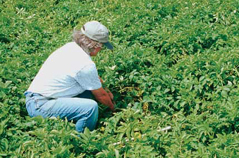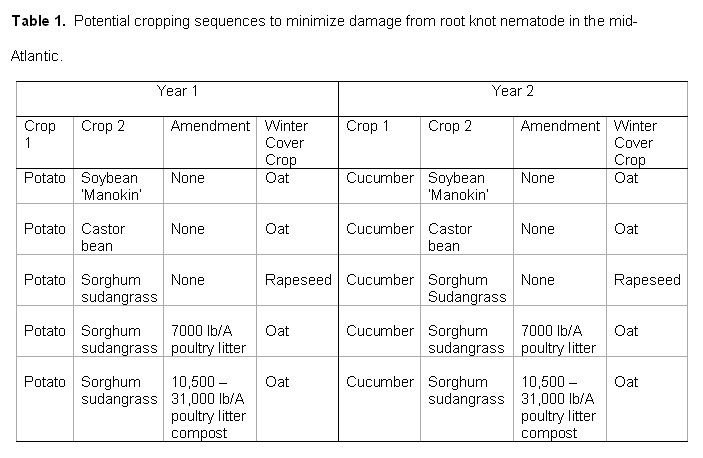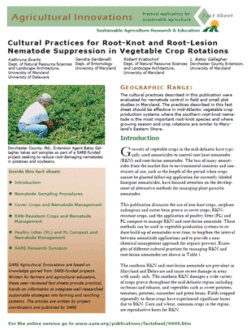
Growers of vegetable crops in the mid-Atlantic have typi-cally used nematicides to control root knot nematodes (RKN) and root-lesion nematodes. The loss of many nemati-cides from the market due to environmental concerns and con-straints of use, such as the length of the period when crops cannot be planted following application for currently labeled fumigant nematicides, have focused attention on the develop-ment of alternative methods for managing plant parasitic nematodes.
The southern RKN and root-lesion nematode are prevalent in Maryland and Delaware and cause severe damage in areas with sandy soils. The southern RKN damages a wide variety of crops grown throughout the mid-Atlantic region including soybeans and tobacco, and vegetables such as sweet potatoes, tomatoes, potatoes, cucumber and green beans. Fields cropped repeatedly to these crops have experienced significant losses due to RKN. Corn and wheat, common crops in the region, are reproductive hosts for RKN.
Root-lesion nematode also has caused severe damage on potato and cucumber, although yield losses due to root-lesion nematode are highly variable and influenced by environmental conditions. In addition, when the fungus Verticillium dahliae is present with root-lesion nematode, potato early dying disease occurs.
Symptoms of plant damage due to nematode activity may initially appear similar to lack of or improper fertilization, too little or too much water, improper soil pH, poor soil, or other environmental factors. Irregular patches in the field with poor plant growth (sickly growth, wilting, yellowing, stunting and premature plant aging) can range from a few feet to hundreds of feet across. Losses due to nematodes may be more prevalent than is currently known
Growers who use nematicides to control root-knot and root-lesion nematode on potatoes and cucumbers incur large expenses. For example, 25% of the pickling cucumber acreage in Maryland and Delaware was fumigated in 1998, a typical year.
Maryland potato growers met in the fall of 1999 and expressed interest in alternative strategies such as cover crops, non-host rotation crops and poultry manure for managing parasitic nematodes in the potato cropping system. The research and management tactics described in this publication were developed as a result of that meeting.
Suppressive cover crops and nematode-resistant rotation crops have been reported to significantly reduce nematode populations in agricultural soils in trials conducted in other regions of the U.S.
Poultry litter (a mixture of poultry manure and pine shaving bedding) and composted poultry litter also have been used as an organic soil amendment to suppress root-knot nematodes and provide an alternative to nematicides. The breakdown of poultry litter (PL) or PL compost stimulates microbial activity in the soil that suppresses nematode damage and reduces population densities.

